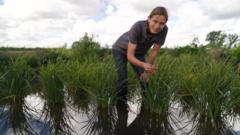Is the UK's First Rice Crop Ready for Harvest After a Hot Summer?

Published: 2025-09-28 01:55:25 | Category: technology
This article explores an innovative agricultural experiment in east England, where the UK's first rice-growing initiative is underway. Farmers Sarah and Craig Taylor, alongside ecologist Nadine Mitschunas, are trialling various rice varieties to determine their viability in the UK’s changing climate. With climate change reshaping agricultural possibilities, this project aims to address food security, farmer livelihoods, and environmental impacts.
Last updated: 22 October 2023 (BST)
Key Takeaways
- The UK's first rice-growing experiment is taking place in Cambridgeshire.
- Nine different rice varieties are being trialled, including those from Colombia and Italy.
- The project aims to explore sustainable agricultural practices amid climate change.
- Peat soils, once underwater, are now drying out and releasing carbon dioxide.
- Initial results suggest rice cultivation may not significantly increase greenhouse gas emissions.
The Experiment: A New Frontier in Agriculture
In a typical field in eastern England, an extraordinary experiment is unfolding. Nadine Mitschunas, an award-winning ecologist, is spearheading the UK's first attempt to cultivate rice, a crop traditionally associated with tropical climates. This initiative, located on a farm owned by Craig and Sarah Taylor, aims to test the boundaries of agricultural possibilities in response to climate change.
Why Rice?
Rice is a staple consumed worldwide, yet its cultivation has been largely confined to warmer climates. However, as the UK experiences unprecedented heatwaves—recorded as the hottest summer since 1884—the potential for rice farming in the region has emerged. The UK Centre for Ecology and Hydrology (UKCEH) has partnered with the Taylors to explore this agricultural frontier, planting various rice types in mini paddy fields to assess their adaptability and sustainability.
Understanding the Project's Goals
This project is not merely about growing rice; it reflects a broader ambition to rethink food production in the context of climate change. As temperatures rise, the agricultural landscape is shifting, prompting farmers to explore alternative crops that can thrive under new climatic conditions. By investigating rice cultivation, the project seeks to address crucial questions about food security and environmental sustainability.
Climate Change and Its Impact on Agriculture
Climate change poses significant challenges to traditional farming practices. Unpredictable weather patterns have increasingly threatened crop yields, forcing farmers to adapt or risk the viability of their livelihoods. The Taylors, deeply rooted in their land's history, recognise the need for change. Craig Taylor notes, "We know things need to change," reflecting the urgency felt by many farmers across the UK.
Potential Benefits of Rice Cultivation
By trialling rice, the Taylors and Mitschunas aim to unlock multiple benefits:
- Sustainable Practices: Flooding peat soils may help sequester carbon, reducing greenhouse gas emissions.
- Diverse Crop Options: Introducing rice could diversify the UK's agricultural output, offering new income streams for farmers.
- Food Security: As domestic food production becomes increasingly critical, local rice cultivation could contribute to self-sufficiency.
Understanding Peat Soils and Their Importance
Peat soils, like those found in the Fens of Cambridgeshire, are some of the most fertile in the UK. However, their condition has deteriorated due to draining for agriculture, leading to environmental degradation and carbon release. Nationally, peat soils contribute to 3% of the UK’s greenhouse gas emissions.
Rewetting Peatlands
One of the project’s innovative strategies involves rewetting peatlands to lock away carbon. By flooding fields, it is possible to preserve peat and mitigate emissions. While rice cultivation can produce methane, a potent greenhouse gas, initial findings indicate that the benefits of sequestering carbon may outweigh the drawbacks.
The Rice Varieties in Trial
In total, nine rice varieties are being tested, sourced from regions globally known for rice production, including Colombia, Brazil, Italy, and the Philippines. Each variety has unique characteristics and potential uses:
- Estrella: A Colombian variety noted for its robust growth.
- Basmati: Renowned for its fragrant grains, perfect for a variety of dishes.
- Sushi Rice: Popular in Japanese cuisine, ideal for making sushi.
- Risotto Rice: Essential for creamy, delicious Italian risottos.
Challenges Ahead
Despite the promising start, cultivating rice in the UK is fraught with challenges. The climate variability poses risks, and commercial farming of rice remains uncertain. Prof Richard Pywell from UKCEH emphasises the experimental nature of this project, noting, "This is the very edge of where rice can grow at the moment." As the climate continues to evolve, understanding which crops can be successfully cultivated will be vital.
The Role of Government and Policy
The UK government is closely monitoring this experiment, with officials from the Department for Environment, Food and Rural Affairs visiting the site. The outcomes could influence future agricultural policy, highlighting the need for innovative solutions to balance food production with environmental stewardship.
Future Implications for UK Agriculture
The implications of successfully growing rice in the UK could be transformative. With agriculture contributing 11.7% of the UK’s greenhouse gas emissions, finding sustainable farming methods is crucial. While the rice project will not resolve the climate crisis overnight, it represents a potential model for future farming practices.
Path Forward
As the project progresses, the Taylors and Mitschunas remain committed to exploring new agricultural paradigms. They advocate for a shift in perspective: "We don’t want people thinking we’re the 'crazy rice farmers'—this is about rethinking the whole system," Craig asserts. Their work highlights the urgent need to adapt agricultural practices to ensure food security while mitigating climate impacts.
Conclusion: A Step Towards Sustainable Farming
The initiative to grow rice in the UK is emblematic of the broader challenges facing agriculture in the era of climate change. By experimenting with new crop varieties and sustainable farming techniques, this project could pave the way for a more resilient agricultural system. The outcome of this trial may not only influence local farming practices but could also serve as inspiration for agricultural innovation worldwide.
FAQs
What types of rice are being grown in the UK?
Various rice types are being trialled, including Colombian Estrella, Basmati, risotto rice, and sushi rice, among others.
Why is growing rice in the UK significant?
This project could provide insights into sustainable farming practices and help address food security in the context of climate change.
What challenges does rice farming face in the UK?
Rice farming in the UK is challenged by unpredictable climate conditions, potential greenhouse gas emissions, and the viability of commercial production.
How does rice cultivation affect greenhouse gas emissions?
While rice farming can produce methane, initial results indicate that flooding peat soils for rice may help sequester more carbon than it emits.
What role do peat soils play in this project?
Peat soils are crucial for this project as they can be rewet to lock away carbon, potentially reducing overall greenhouse gas emissions from agriculture.
As we explore innovative agricultural practices, how will the future of food production in the UK evolve? #UKRice #ClimateChange #SustainableFarming



